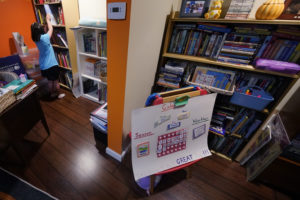
by Maina Mwaura, Urban Faith Contributing Writer | Feb 23, 2022 | Entertainment, Headline News |
Kim Bass is one of the most well respected and prolific writer/producers in the nation. He achieved TV gold as writer and producer on three of the most well known and inspirational TV shows for black audiences: In Living Color, Sister Sister, and Kenan & Kel.
UrbanFaith sat down with him to discuss his newest film Tyson’s Run which is in theaters everywhere March 11.


More information on the film is below:
When fifteen-year-old Tyson attends public school for the first time, his life is changed forever. While helping his father clean up after the football team, Tyson befriends champion marathon runner Aklilu. Never letting his autism hold him back, Tyson becomes determined to run his first marathon in hopes of winning his father’s approval.
With the help of an unlikely friend and his parents, Tyson learns that with faith in yourself and the courage to take the first step, anything is possible. In theaters nationwide on March 11, 2022. Find tickets at TysonsRun.com
by Jaimie Crumley | Dec 5, 2021 | Headline News |
“Do not neglect to show hospitality to strangers, for by doing that some have entertained angels without knowing it” (Hebrews 13:2, NIV).
Have you ever known someone who never meets a stranger?
Folks who live their lives in such a way that nearly everyone they meet becomes a new friend astound me with their generosity of spirit. I admire their courage and zest for life, which compels them to embrace even those they do not know well, knowing that each creature has gifts to share with the world.
As a faith leader, when I meet folks with those sorts of spirits, I see some of the Spirit of Christ who, although divine, shared meals with the poor, sick, and sinful, laid hands on the infirm, and drew close to the crowds without reservation.
Even in His dying moment, Jesus stretched His arms wide as though embracing all of us and declared forgiveness over us because we did not realize what we were doing. Jesus is the embodiment of the grace of hospitality, and I would argue that hospitality is the biggest gift we, the body of Christ, can offer the world right now.
The Fear Factor
The current social and political climates have caused me to take a step back to examine what Scripture teaches us about welcoming strangers among us. I confess that I focus much of my time concerning myself with the sins that other people perpetrate on each other. I concentrate on the news stories about hate crimes without giving much consideration to the ways that I allow hate and fear to fuel my actions.
The truth is that fear motivates so much of what we do. Our fears prevent us from loving and practicing hospitality in the ways that our faith demands of us. In today’s social media culture, many of us have a fear of rejection. As humans, many of us also have a fear of not knowing which prevents us from meeting new people and having new experiences.
We also often have fears of being powerless that cause us to try to stay in places that make us feel powerful. We allow our fears to impede upon our ability to love.
Before turning outward and critiquing national and international leaders, I want to encourage us, especially during this introspective liturgical season called Lent, to look within to ask ourselves how we are practicing the kind of hospitality that Scripture and the example of Jesus Christ demand of us.
Love Thy Neighbor?
Many of us have learned the classic stories about hospitality in Sunday School and Sunday morning sermons.
We have heard about Abraham and Sarah, who unknowingly hosted angels who foretold the birth of Sarah’s son. In the passage from Hebrews I cited at the top of this article, the author alludes to that passage from Genesis. Despite the many admonitions throughout the Hebrew Bible to care for the foreigner, widow, and orphan, we, like the lawyer in Luke 10, often ask, “Who is my neighbor?”
In response to that question, we have heard Luke’s well-known story of the Good Samaritan who, despite his vastly different culture and faith, cared for an Israelite stranger he found injured on the side of the road. Even after hearing such a dramatic story of sacrificial love, we continue to struggle with caring for our neighbors. Perhaps my favorite aspect of the story is the way it condemns us for the times we fail to show love to people who are just like us.
We have become politically motivated to care for immigrants in recent months, as we should, but we mistreat those who sit right next to us in the pew or who share our offices at work!
Jesus tells Israelite listeners the story of an Israelite man who was robbed as he traveled from Jerusalem to Jericho. A priest passed by and walked on the opposite side of the road to avoid helping. Then, a Levite, a religious leader from the priestly tribe of Levi, passed him. Only a Samaritan, a man who was from a different culture and faith background, cared for the man.
Many commentaries have explained that the priest and the Levite probably did not interact with the victim because of concerns about ritual purity, but does that not cause us to consider our priorities? We cannot prioritize legalism over mercy and love. Here was Jesus, the Lamb of God who takes away the sins of the world, essentially urging His listeners to ritually defile themselves because mercy is at the heart of the Gospel.
The Missing Link
 What the world needs from the church is for us to be the church. The time is now for us to commit ourselves to following Jesus Christ in our actions. It was the way the early Church first began to thrive.
What the world needs from the church is for us to be the church. The time is now for us to commit ourselves to following Jesus Christ in our actions. It was the way the early Church first began to thrive.
As J. Ellsworth Kalas puts it in his book The Story Continues: The Acts of the Apostles for Today, “The Christian church was born in a time and culture when the marketplace of beliefs was crowded to its borders. Religion was everywhere … This meant that it was easy to talk religion, but also that it was difficult for the decision to get serious. No wonder, then, that the followers of Christ were known as ‘people of the Way.’”
The earliest Christians stood out, and they increased in number because they lived their Christianity; for them, it was not simply an interesting intellectual idea. They attracted converts because of their countercultural way of viewing religion as more than a list of philosophies.
Rev. Dr. Martin Luther King Jr. provided a practical understanding of this concept in his sermon “A Knock at Midnight,” which appears in his 1963 book of sermons called Strength to Love. King preached, “The church must be reminded that it is not the master or the servant of the state, but rather the conscience of the state … if the church will free itself from the shackles of a deadening status quo, and, recovering its great historic mission, will speak and act fearlessly and insistently in terms of justice and peace, it will enkindle the imagination of mankind and fire the souls of men, imbuing them with a glowing and ardent love for truth, justice, and peace.”
In other words, from the Scripture we read, to the prayers we pray, to the songs we sing, our worship is real and lived and must transform us from the inside out. The church is not a place to go; the church is a thing to do. We call the physical buildings in which we worship churches, but the church is the body of Christ, at work in the world.
So, what does living our faith teach us about hospitality?
A Place Where Ministry Happens
One of my mentors in ministry began a new pastorate at the end of 2016. After examining the needs and challenges of ministry at her new church, she chose as her theme of her church “Radical Hospitality.” The new framework of thinking about the church as a place where radical hospitality happens has changed it in practical ways in just a few short months.
Church members are beginning to imagine their worship space as first and foremost a place where ministry happens. That sounds obvious, I know, but so many churches have gotten away from thinking of themselves as being ministry spaces above all else.
One of the most drastic changes she has made as pastor has been to reimagine the parsonage, the house that is owned by the church for use by pastors and their families. That house now serves a dual purpose. It is both a “meeting house” where retreats, Bible study, and meetings can occur, and it provides accommodations for the pastor and visiting ministers.
Knowing my colleague, and understanding what it means to be “radical,” I am expecting that in the months and years to come, her new ministry will continue to grow and transform to become more welcoming for all people.
It is our task, as the Samaritan did in the Gospel of Luke, to embrace all we meet. As Hebrews 13:2 reminds us, we do not know the actual identity of those we encounter each day. Scripture teaches us that if we open our hearts to the possibility, each stranger has gifts to share with us that will enhance our lives. My fellow people of the Way, let us go forward with joy to spread Christian hospitality.
Jaimie Crumley is a minister, blogger, podcaster, and ministry consultant. She blogs about race, gender, history, and Christian faith at iamfreeagent.com.
Share your thoughts on ministry and hospitality below.
by Monica M. Jones | Dec 1, 2021 | Headline News |
Video Courtesy of WKBW TV | Buffalo, NY
Turkey dinners, desserts for days, decorating the house, planning for parties, and power-shopping until the wee hours of the mornings — yes, it’s that time of the year. And just as Thanksgiving, Christmas, and New Year’s Eve come at the same time each year, without fail every holiday season, the very people you’re supposed to be cherishing are the ones who seem to bring you the most stress.
Unfortunately, the picture-perfect family dinner we see on television is not something that always translates to our personal situations. With crazy relational dynamics that can test one’s patience and sanity, there’s a bit of dysfunction in every family — and it’s often heightened during the holidays.
While on the surface certain family members may appear to be the enemy, they are people to whom God has connected you for a reason, and they’re often the first opportunity we have to learn to “love your neighbor.” As the old saying goes, “You can choose your friends, but you can’t choose your family.” With that in mind, here are five tips to help you navigate family drama during this most joyful season.
1. Learn how and when to say no. You can’t satisfy everyone in your family, and the quicker you realize that the better you and your family will be. Set boundaries for yourself and your personal relationships. With pressure to shop for gifts, attend holiday parties and family gatherings, as well as your usual everyday demands of work and family, it’s easy to get overwhelmed. You have to remember that you’re just one person, you can’t do everything. You may not be able to go to every party that you’re invited to and you may even have to make adjustments to plans for traveling to see different relatives. Set priorities and stick to them.
2. Accept your family’s differences. We all have that aunt or uncle who drinks a little too much and lets their mouths get them into trouble. Or there’s the cousin who always comes late with the main dish — so the family is waiting for hours to eat. Whatever your family scenario, remember that we all have our own idiosyncrasies that can be irritating — and honestly we all probably have a bit of crazy deep down inside. It doesn’t mean you condone or agree with certain behaviors, but you just don’t let it hang you up. Don’t sweat the small stuff that you can’t change.
3. Keep it simple. Whether it’s with gift-giving, hosting a family gathering, or cooking a dish for a family potluck — make it easy on yourself. While you may want to stick to traditions, it’s okay to make adjustments. Instead of cooking, maybe you can buy a prepared dish. You may want to do it all on your own as your mother did back in the day, but know that it’s okay to ask for help. Get other family members involved with planning and preparing holiday meals or gatherings. When it comes to gifts, stick to a budget. Be real about your financial situation; if you can’t afford to buy everyone — or anyone — a gift, it’s okay. Your presence really is enough.
4. Keep conversations light. Avoid hot-button issues during the holidays. Keep conversations light and focus on the good. Trying to flesh out unresolved conflicts at the dinner table is probably not a good idea — especially because of the spirit of the season. Try to find things that you have in common with your loved ones and bring those elements into your conversations. Often tension and angst arise from misunderstandings and miscommunication. Find common ground, which will help in the end to build stronger bonds that last beyond the Christmas dinner at Granny’s.
5. Take time out for yourself. Focusing on everyone else, it’s easy to forget about yourself. If it’s no more than 15 minutes or an hour, take some time for you. Do something you want to do. Seeing a movie, reading a book, journaling, exercising — whatever you need to do to tend to your mind, body, and soul do it. Even Jesus needed some time alone.
The Real Reason for the Season
When it’s all said and done, remember what the holidays are really all about. Taking time to be thankful for the blessings in your life, celebrating the birth of Christ and looking ahead to the New Year, it’s a time to reflect and put things in a proper perspective.
After all, Jesus had supper with Judas (who betrayed Him) and Peter (who would later deny Him). If He can forgive and show love, shouldn’t we follow His lead and extend grace to those special relatives who annually work our last nerve?
So how do you survive the stress that the holidays can put on family relationships? Share your thoughts and tips for coping below.

by C.B. Fletcher, Urban Faith Contributing Writer | Nov 15, 2021 | Headline News, Relationships |
It’s not easy to be hated by the person who is supposed to love you most, and unfortunately, being toxic has become normalized in our culture.
Many see misdirected aggravation, gaslighting, physical abuse, and more as “love tactics.” When a child only knows pain as a source of love, then they too love in that way and any other form of healthy love seems abnormal.
However, the question is, can a person ever love authentically if they were raised to be toxic?
The assumption is no. When someone is exposed to consistent, toxic stress, they are vulnerable to mental and physical illness that can sometimes develop into a genetic trait, according to Hey Sigmund; therefore this behavior is biologically passed on through generations.
However, despite the science behind the effects of toxic love, there is always hope for a better life.
Fighting for Love
 “I just felt like I wasn’t loved by my mom, says Monique, a woman in her 40s who was often told she wasn’t good enough. “I felt growing up in my mom’s house I wasn’t allowed to be me, an individual.”
“I just felt like I wasn’t loved by my mom, says Monique, a woman in her 40s who was often told she wasn’t good enough. “I felt growing up in my mom’s house I wasn’t allowed to be me, an individual.”
To suit her mother’s perfect image of a family, Monique, was to participate in certain activities without any consideration of her talents or desires. While at the same time, her brother was given free reign to participate in activities of his choice throughout their childhood.
And to make matters worse, Monique’s father suffered from Post Traumatic Stress Disorder (PTSD) and would often abuse her. She recalls him touching her to satisfy his physical desires and severely beating her when she reported it to her incredulous mother.
Fortunately, Monique found refuge in her grandmother’s home, where she found the kind of love her mother envied. Monique remembers her mother punishing and verbally abusing her as a result of the love she received from her grandmother.
Like many girls, Monique found herself looking for love in empty relationships during her teen years that lead to a forced, terminated pregnancy and physical and emotional abuse similar to the treatment she received from her own father.
Eventually, Monique met a gentle and caring man named Laz. However, Laz’s compassion and gentleness were unfamiliar to her, which ultimately lead to Monique returning to one of her previous, toxic relationships.
She went on to marry a former flame named Xavier and stayed in her abusive marriage for eight years.
“Towards the end of my [3rd] pregnancy, I found out he was cheating and when I confronted him, he hit me,” says Monique who recalls her toxic relationship that mirrored her childhood. “He asked, ‘Who are you to question me?’…It felt like because of the way I grew up, if I wasn’t getting hit, then it wasn’t love,”
After her divorce, Monique fought against her toxic past. She made the decision to rise above her father’s mental illness, her mother’s jealousy and apathy, and their collective effort to make her their emotional punching bag for their marriage troubles.
Although the struggle did not end after her marriage when it came to love, her children, and health, she remains hopeful enough to fight for the love she deserves. She charges her will to carry on to God, because without Him, she would have taken the final blow to end her suffering.
Turning Off the Gaslight
Bella was born to a Catholic family that rejected her mother for having a baby with a man that she later learned was married. The rejection caused her mother to make multiple attempts to prove her worth to the family by making Bella seem exceptional, but in private her mother was spiteful and unloving as the list of accomplishments grew.
“[My mother] did everything for me to prove herself, but not for the love of me,” Bella explains. “She worked hard to put me through private school and extracurricular activities, but at home I was repeatedly told I was nothing; sometimes she even called me a waste of a human being. To this day, she has never told me she loves me.”
Whenever something would go wrong in Bella’s life, she would automatically blame herself as a result of her relationship with her mother. Even when her husband and father of their two children committed adultery, she took the blame.
As time went on, Bella lost the love of her life, her job, and believed that she would never be loved which drove her into a suicidal state .
Until one day, Bella decided that she had enough and began to fight for her life, beauty, and self-love through therapy. “Once I figured out that I wasn’t this awful, unlovable monster that I was made to believe as a reality by someone who was unloved, it turned my world upside down in a great way,” Bella says. “It never would have happened without me doing the work in therapy.”
As a result of her treatment, Bella was led to a love that she has been enveloped in for the last four years. Even though the pain of rejection transcended through two generations, love won in the end.
“In the middle of all of this, I met a man who just rained love on me,” Bella joyfully exclaims.
Is there hope after a toxic upbringing?
 “But you have this in your favor: You hate the practices of [your abuser], which I also hate” (Revelations 2:6, NIV).
“But you have this in your favor: You hate the practices of [your abuser], which I also hate” (Revelations 2:6, NIV).
In the beginning of this article, the question was, can a person love authentically if they were raised to be toxic? The answer is yes, but you must fight for it.
It is easy to nurse the scars of someone that you love, because love is to be unconditional, right? But what good is unconditional love when a person’s pain has replaced the spirit that you desperately want to love?
That is spiritual warfare and it is best to back away and allow God to handle it if they are unwilling to get help. It is important to recognize the signs of someone who has been abused and trying to regain power, which can include verbally sharing memories of their toxic loved ones.
Fortunately, Bella and Monique worked past those painful memories found a way to defeat them so that the tradition of toxicity ended with them and a reign of love could begin.

by David Crary, AP National Writer | Jul 27, 2021 | Commentary, Headline News |

Felicity Brown, 9, uses a workbook to practice math with her parents and siblings at home in Austin, Texas, on Tuesday, July 13, 2021. After homeschooling during the pandemic, the Brown family has switched to homeschooling their kids permanently using a Catholic-based curriculum and won’t be sending them back to in-person schools in the fall. (AP Photo/Eric Gay)
Although the pandemic disrupted family life across the U.S. since taking hold in spring 2020, some parents are grateful for one consequence: They’re now opting to homeschool their children, even as schools plan to resume in-person classes.
The specific reasons vary widely. Some families who spoke with The Associated Press have children with special educational needs; others seek a faith-based curriculum or say their local schools are flawed. The common denominator: They tried homeschooling on what they thought was a temporary basis and found it beneficial to their children.
“That’s one of the silver linings of the pandemic — I don’t think we would have chosen to homeschool otherwise,” said Danielle King of Randolph, Vermont, whose 7-year-old daughter Zoë thrived with the flexible, one-on-one instruction. Her curriculum has included literature, anatomy, even archaeology, enlivened by outdoor excursions to search for fossils.
The surge has been confirmed by the U.S. Census Bureau, which reported in March that the rate of households homeschooling their children rose to 11% by September 2020, more than doubling from 5.4% just six months earlier.
Black households saw the largest jump; their homeschooling rate rose from 3.3% in the spring of 2020 to 16.1% in the fall.
The parents in one of those households, Arlena and Robert Brown of Austin, Texas, had three children in elementary school when the pandemic took hold. After experimenting with virtual learning, the couple opted to try homeschooling with a Catholic-oriented curriculum provided by Seton Home Study School, which serves about 16,000 students nationwide.
The Browns plan to continue homeschooling for the coming year, grateful that they can tailor the curriculum to fit their children’s distinctive needs. Jacoby, 11, has been diagnosed with narcolepsy and sometimes needs naps during the day; Riley, 10, has tested as academically gifted; Felicity, 9, has a learning disability.
“I didn’t want my kids to become a statistic and not meet their full potential,” said Robert Brown, a former teacher who now does consulting. “And we wanted them to have very solid understanding of their faith.”
Arlena Brown, who gave birth to a fourth child 10 months ago, worked as a preschool teacher before the pandemic. Homeschooling, she says, has been a rewarding adventure.
“In the beginning, the biggest challenge was to unschool ourselves and understand that homeschooling has so much freedom,” she said. “We can go as quickly or slowly as we need to.”

Felicity Brown, 9, draws as she takes a break from math practice at her home in Austin, Texas, Tuesday, July 13, 2021. After homeschooling during the pandemic, the Brown family have switched to homeschooling their kids permanently using a Catholic-based curriculum and won’t be sending them back to in-person schools this fall. (AP Photo/Eric Gay)
Race played a key role in the decision by another African American family to homeschool their 12-year-old son, Dorian.
Angela Valentine said Dorian was often the only Black student in his classes at a suburban Chicago public school, was sometimes treated unfairly by administrators, and was dismayed as other children stopped playing with him.
As the pandemic eased, the family decided to keep Dorian at home and teach him there, using a curriculum provided by National Black Home Educators that provides content for each academic subject pertaining to African American history and culture.
“I felt the burden of making the shift, making sure we’re making the right choices,” Valentine said. “But until we’re really comfortable with his learning environment, we’ll stay on this homeschool journey.”
Charmaine Williams, who lives in the St. Louis suburb of Baldwin, also is using the National Black Home Educators curriculum as she homeschools her 10-year-old son, Justin, and 6-year-old daughter, Janel.
Williams said she and her husband tried two previous stints of homeschooling for Justin after school officials complained about his behavior. Now — with the new curriculum and an accompanying support network — they feel more confident about choosing it as a long-term option.
“At school, children have to follow a certain pattern, and there’s bullying, belittling — compared to being home where they’re free to be themselves,” Williams said.
“There’s no turning back for us now,” she added. “The pandemic has been a blessing — an opportunity to take ownership of our children’s education.”

Lily Osgood, 7, selects a book to read from the family library of nearly 2,000 books she shares with her brother, Noah, Tuesday, July 20, 2021, in Fairfax, Vt. The Osgood children will continue to be homeschool this upcoming school year. As the pandemic took hold across the United States in the spring of 2020, it brought disruption and anxiety to most families. Yet some parents are grateful for one consequence: they are now opting to homeschool their children even as schools plan to resume in-person classes. (AP Photo/Charles Krupa)
Joyce Burges, co-founder and program director of National Black Home Educators, said the 21-year-old organization had about 5,000 members before the pandemic and now has more than 35,000.
Many of the new families experienced difficulties, including lack of internet access, that limited their children’s ability to benefit from virtual learning during the pandemic, Burges said.
“It got so they didn’t trust anything but their own homes, and their children being with them,” she said. “Now they’re seeing the future — seeing what their children can do.”
For some families, the switch to homeschooling was influenced by their children’s special needs. That’s the case for Jennifer Osgood of Fairfax, Vermont, whose 7-year-old daughter Lily has Down syndrome.
Having observed Lily’s progress with reading and arithmetic while at home during the pandemic, Osgood is convinced homeschooling is the best option for her going forward.
She has made the same decision for her 12-year-old son Noah, who didn’t like the remote classes offered by his public school in the spring of 2020, and did homeschooling throughout the 2020-21 school year. It went so well that they want to continue for at least a few more years.
“He told me he was learning so much more at home than he ever did in school,” Osgood recalled. “He said, ‘School is just so chaotic — we don’t get very much done in any particular class. Here, I sit down, you tell me what to do, and minutes later I’m done.'”
Heather Pray of Phoenix, Maryland, says homeschooling has been a major success for her 7-year-old son, Jackson, who has autism. The family made the switch because Jackson was struggling with the virtual learning that his school provided during the pandemic.
“My son did great (with homeschooling), even with just two hours of schoolwork a day,” Pray said. “I got him into piano lessons, taught him to read.”
Pray is also homeschooling her daughter, Hayley, who’s going into 7th grade and had been attending a Christian school.
“I had no idea how this was going to go — I just dove in headfirst,” said Pray. “I felt God was holding my hand.”
The Gonzalez family from Appomattox, Virginia — who are devout Catholics — opted to homeschool their three sons, ages 9, 13 and 15, after their Catholic school in Lynchburg closed in 2020 due to falling enrollment.
They’re using the Catholic-focused curriculum from Seton Home Study School, which Jennifer Gonzalez, the boys’ mom, described as rigorous but well-organized.
“My kids have just excelled,” she said. “We’re able to be home and be together.”




 What the world needs from the church is for us to be the church. The time is now for us to commit ourselves to following Jesus Christ in our actions. It was the way the early Church first began to thrive.
What the world needs from the church is for us to be the church. The time is now for us to commit ourselves to following Jesus Christ in our actions. It was the way the early Church first began to thrive.
 “I just felt like I wasn’t loved by my mom, says Monique, a woman in her 40s who was often told she wasn’t good enough. “I felt growing up in my mom’s house I wasn’t allowed to be me, an individual.”
“I just felt like I wasn’t loved by my mom, says Monique, a woman in her 40s who was often told she wasn’t good enough. “I felt growing up in my mom’s house I wasn’t allowed to be me, an individual.” “But you have this in your favor: You hate the practices of [your abuser], which I also hate” (
“But you have this in your favor: You hate the practices of [your abuser], which I also hate” (


